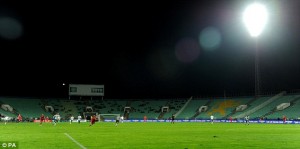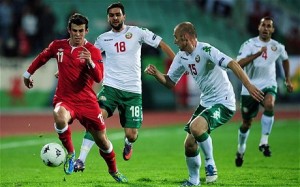 It would be ridiculous for me to claim that Wales have ever been a world (or even European) power in international football, but we have always been better than the real minnows of the game. Actually, I say “always” there, but I am wrong – for a few important hours during the summer, we were classed amongst the lowest of the low. The draw for the qualifying groups for the 2014 World Cup was held on 30 July and, thanks to a diligent student from the Faroe Islands (yes, that’s the Faroe Islands!), FIFA were convinced that his country, with whom we were level at a truly dismal 114th in the World Rankings, should actually be above us if the fractions involved were not rounded up or down.
It would be ridiculous for me to claim that Wales have ever been a world (or even European) power in international football, but we have always been better than the real minnows of the game. Actually, I say “always” there, but I am wrong – for a few important hours during the summer, we were classed amongst the lowest of the low. The draw for the qualifying groups for the 2014 World Cup was held on 30 July and, thanks to a diligent student from the Faroe Islands (yes, that’s the Faroe Islands!), FIFA were convinced that his country, with whom we were level at a truly dismal 114th in the World Rankings, should actually be above us if the fractions involved were not rounded up or down.
So it was that Wales suffered the ignominy of being placed in Pot F for the draw (there was no Pot G!) along with Liechtenstein, Iceland (what were they doing there as well?), Kazakhstan, Luxembourg, Malta, Andorra and San Marino while Armenia, Finland, Estonia, Cyprus, Latvia, Moldova, FYR Macedonia, Azerbaijan and Faroe Islands were rated above us in Pot E. Now, some of those sides in Pot E are on the rise at the moment, while others have tended to be better than us most of the time, but Azerbijan and the Faroe Islands are teams that we have faced in qualifying groups in the fairly recent past and we have only failed to beat them in one of eight meetings (a 1-1 draw in Baku in 2004) – there is no way that those sides should be seeded above us.
The fact that they were, offered proof of how bad things had become – too many players were retiring before their time rather than play for the unpopular John Toshack, the so called “golden generation”, that formed the backbone of the successful Welsh Under 21 sides of the late noughties, had not made the impact expected of them (injuries to players like Bale, Ramsey and Collison had not helped in that regard) and a tendency to arrange friendly matches against sides placed well above them in the rankings were all factors in Wales’ demise. Things got worse as well as a virtually full strength team slumped to a very poor 2-1 defeat at Cardiff City Stadium against Australia on 10 August which saw our ranking drop another five places, but, worse than that, the performance had, for the main, been so uninspiring and lacking in urgency that I found myself thinking that Pot F could well become our natural home in the coming years.

The Welsh team might be improving rapidly and contain some young players surely destined to be world stars, but the locals were hardly flocking to see us last night in Sofia!
What me and other critics had failed to notice though was how strongly Wales finished that game – while it would be an exaggeration to claim Australia were hanging on at the end, they were put under more pressure once Gareth Bale and Craig Bellamy had switched flanks for those closing stages than they had been in the previous eighty minutes. There was a quicker pace from Wales during this time and when Montenegro visited City’s new home less than a month later on what appeared to be an untroubled path to a top two place in a Euro 2012 qualifying group which saw Wales anchored to the bottom with no points from four matches, they got a real shock as the home team looked to hit their talented wide players earlier. Montenegro were fortunate to escape with a 2-1 defeat and, although it was just one game, there was a definite feeling that a corner had been turned.
A narrow and slightly unfortunate defeat against England did not extinguish the feelgood factor that was building up around Gary Speed’s team and they rewarded the new faith being shown in them by supporters on Friday with their best display in ages as Wales got back in Montenegro’s good books by beating Switzerland 2-0 to guarantee the tiny Balkan country a place in the Play Offs for the Finals in Poland and Ukraine this summer.
The transformation in fortunes had been amazing – two sides in the top twenty of the World rankings had been beaten and one in the top ten had been given a real fright before scraping a 1-0 win. All of a sudden, a trip to Sofia against a side ranked thirty odd places above us (who had been World Cup Semi Finalists in 1994), was being treated almost like an away banker by people like me who considered the team to be a joke six weeks ago! Yes, the performances in our last two home games had been very encouraging, but, the positive reviews our showing at Wembley earned could not alter the fact that we had not beaten a team above us in the rankings in a competitive away game for four years – if claims that we can challenge for a place in Brazil in three years time were to have any substance, Wales had to start winning away from home.

Teams are tripling up on Gareth Bale it seems, but now you get the feeling we have others who can exploit the spaces such an approach leaves.
Of course, it needs to be remembered that Bulgaria are in the same sort of disarray as we were only a few weeks ago – like Wales, they finished the qualifying process off with the third manager they had used during the competition, but as their young and much changed team were under the command of the man most of them had played for at Under 21 level, you would have thought this would have guaranteed that Wales would be facing a team that was at least giving it’s all. However, as it turned out, I can only remember feeling that Bulgaria were going to score the once and that was just before former Man City player Valeri Bojinov missed a straightforward chance in the dying minutes. Apart from that, I didn’t think the Welsh defence was in any danger throughout – this was in spite of having to deal with the loss of Darcy Blake, to the now traditional Cardiff City injury, in the first half and, on the balance of play, a Wales team who did much as they pleased, were worth more than a 1-0 win.
The decisive goal came from the brilliant Gareth Bale, who raced on to substitute Adam Matthews’ fine pass, cut inside and scored, via a deflection, from twenty yards, but there could have been many more – not least when the impressive Aaron Ramsey teamed up with Bale for the latter to crash a volley against the underside of the cross bar. One of the few minuses to come out of the last two matches was the lack of quality from Craig Bellamy in the finishing department – so many of his shots were scuffed against Switzerland and, in a more subdued showing last night, he could have done better with two very presentable chances provided by Ramsey. Bellamy was also just wide with a better effort in the second half, while there were a string of crosses from the byeline by Bale in particular that cried out for someone to apply a finishing touch. Still, although Wales weren’t as clinical as they might have been, there was much to admire – Joe Allen again looked like a seasoned campaigner at this level, Andrew Crofts went about his business quietly and efficiently, Chris Gunter added to the impression I get that he is playing a lot better for his country than he is for his club and Adam Matthews looked composed and competent in his defending.
So, why has this team that couldn’t do a thing right less than two months ago, now got us looking at them as if the fifty odd year wait for Wales to play in the Finals of an international tournament is about to end? Well, firstly, I think the question I asked is typically Welsh in that it assumes that our team was awful and is now brilliant when the truth is that neither was/is true – is there another country where the mood, particularly when it comes to our sporting teams, swings between extremes so much? There is no doubting though that there have been significant improvements in the Wales team over the past three months and I’d credit it with the following;-
1. The return of key players from injury (in particular Aaron Ramsey and Gareth Bale – it’s a long time since we have had both of them fully fit and available at the same time).
2. The confidence gained by the Swansea and Norwich players in the squad from playing in the Premiership week in, week out – despite missing nine or ten through injury again, Wales were able to put out a team that included nine players who have been regulars in the Premiership this season for their clubs.
3. The influence of a manager who this group of players hold in great respect and want to play for. The fact that Gary Speed is highly respected has been obvious from the moment he was appointed, but I’m sure I wasn’t the only supporter who sometimes wondered if that respect was down to what he did as a player rather than anything in his management. I think it is fair to say that Speed has gone a long way towards dispelling such notions in recent weeks by getting things right tactically and when it comes to selection – for me, he is also striking the right note between expectancy and realism in his interviews with the media.
4. The realisation among some of those who did so well for the Under 21 team that they are able to reproduce what they did at that level on the bigger stage – the talent was always there, but now they are getting the belief to go with it.


